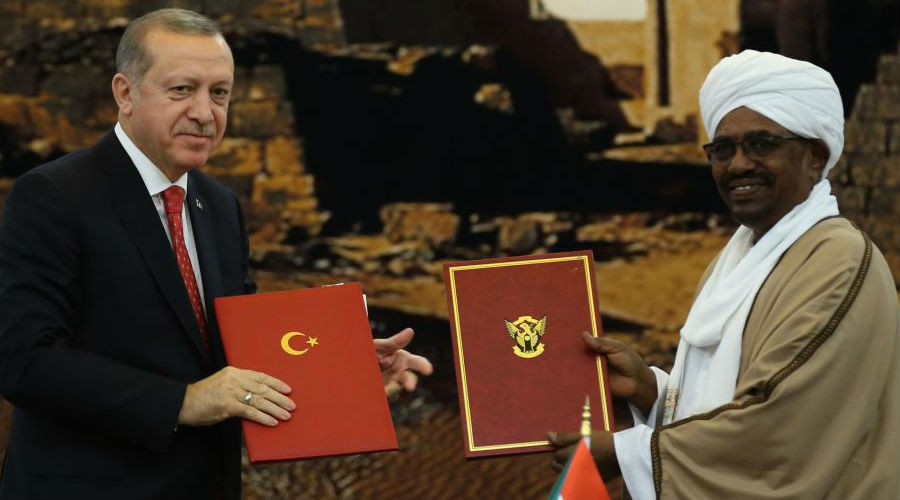As part of its efforts to boost its presence on the Red Sea and the Indian Ocean coast, Turkey has cemented ties with several African countries, including Sudan, Somalia and Djibouti, through economic and military agreements. Through developing ever-closer ties with these countries, Turkey seeks to achieve strategic and economic goals including boosting trade and establish a launching pad to expand its presence and investments throughout Africa.
Intense Movements
Through a sequence of steps, Turkey is bolstering its presence at ports in the Red Sea and the Indian Ocean. In late September 2017 in Somalia, Turkey officially opened its biggest overseas military base, which includes three military residential complexes, training venues and other facilities, south of the Horn of Africa’s capital Mogadishu on the Indian Ocean.
The move reflects growing Turkish-Somali trade and investment relations. Turkey attempted to exploit this growth to achieve other strategic goals. The Turkish International Cooperation and Development Agency has offered a total of US$400 million in aid to Somalia, a huge amount that helped Turkey secure support from the Somali government for the Turkish military base.
On December 24, 2017, during a visit by President Recep Tayyib Erdogan to Sudan, the Turkish government signed an agreement with the Sudanese government to restore Suakin Island, on Sudan’s Red Sea coast, paving the way for broader trade and economic relations following the lifting of economic sanctions on Sudan in October. As the two states are looking forward to expanding cooperation into other investment venues, Ankara seeks to inject capital into Sudan’s agricultural, industrial and services sectors. To this end, the two states signed a total of 21 bilateral agreements to boost trade and investment.
Djibouti is another African country on the Red Sea where Turkey seeks to bolster its presence. In December 2016, Turkey signed an agreement with the Horn of Africa country to build a five million square meters free economic zone on the Red Sea. The move was in line with Djibouti’s political and economic openness to regional and international powers, aimed at attracting foreign investments to drive development.
Multiple Goals
The goals of Turkey’s efforts to expand its presence near sea ports in the Middle East can be outlined as follows:
1- Investment opportunities. Turkey is making diligent efforts to enhance its ability to compete with regional powers that have a special interest in building and developing seaports on the Red Sea or the Indian Ocean to make trade and investment gains.
These efforts would provide an opportunity for Turkey to achieve trade and economic integration, and cement partnerships with some international economic powers that are equally ambitious to bolster their presence on the Red Sea coast. For instance, China established a 46 square kilometers free trade zone in Djibouti as part of Beijing’s plan to expand trade routes through the the One Belt and One Road Initiative, a grand scheme for knitting a network of roads, ports, railways and other infrastructure projects spanning more than 60 countries.
2- Trade Markets. Turkey’s movements can contribute towards increasing trade between Turkey and the three African countries. Turkey is well aware that its trade with Sudan, for instance, is still weak at below $500 million a year. Hence, new seaports can help Turkey increase exports to existing markets in Sudan as well as new markets in Somalia. Turkish exports to Somalia totaled just $5.1 million in 2010 but ballooned to $123 million in 2016. For Turkey, rapidly growing trade with the region provides a significant trade link to Africa, as its bilateral trade volume with this continent reached $17.5 billion in 2015, a three-fold increase in volume compared to the records of 2003.
3- Multilateral Partnership. Turkey views the port sector in countries, such as Sudan, as an important partnership that provides a favorable investment opportunity, which can yield high revenue, especially after economic sanctions against Sudan were lifted in October 2017. Accordingly, this could support Sudan’s imports and exports in the coming period. This will reflect on the scale of work at the port to be built on Suakin Island. Moreover, Turkey can also use the new free trade zone in Djibouti as an important trade hub to export raw materials and manufactured goods to nearby East African countries.
Sudan’s decision to grant Turkey the right to develop Suakin Island represents a strategic shift in the economic partnership between the two countries. The project will pave the way for Turkey to channel more investments in Sudan’s various economic sectors. The volume of Turkey’s investments in Sudan currently stand at $2 billion, but the two countries plan to increase it to $10 billion in the future.
Expected Limits
Turkey is not the first country to look forward to building maritime partnerships with countries in this region. But although other regional and international powers already have presence in this region, it is perhaps possible to argue that moves by any country to bolster its presence at seaports does not necessarily mean they would reduce gains for the other involved countries, as is the case in Djibouti where military bases of several foreign countries were already established. Apparently, considerable port potential in a country such as Sudan may allow for presence of a large number of countries interested in pumping investments in its maritime shipping industry. This means that competition between other regional and international powers is unlikely to escalate to the extent where one party makes all available gains while all other parties suffer losses.
Any of these recipient countries may seek to take advantage of the race between foreign powers for access to their seaports to diversify its own economic partnerships with other countries, which would ultimately serve its economic development and earn it increasing financial revenue.
Turkey moves to gradually strengthen its influence in the Red Sea to make strategic and economic gains in the wider Middle East and Africa, but this does not mean it would be the sole party in this region where potential gains can be limited.


